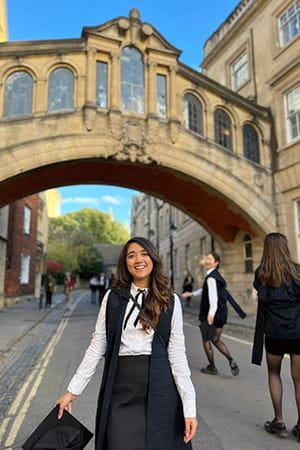Cristie Contreras Burrola has never shied away from a challenge. The path of this third-year student in the Medical Scientist Training Program — from a childhood in Ciudad Juarez, Mexico, to cutting-edge cancer immunotherapy research across two continents — is a testament to resilience, curiosity and the power of mentorship.
Contreras Burrola’s story began in Ciudad Juarez, a city of contrasts.
“On one side, there was a welcome sign inviting businesses and industry to bloom; on the other, the rise of violence drove families out, including mine,” she said. At 14, Contreras Burrola moved to Tennessee, not knowing English, but determined to seize every opportunity. Her family inspired her deep-rooted work ethic and passion for service: her mother rose from production to plant management, earning a graduate degree in the process, and her grandmother was unwavering in her commitment to community.
After earning her biomedical engineering degree from the Massachusetts Institute of Technology (MIT) in 2017, Contreras Burrola joined the Indiana University School of Medicine Medical Scientist Training Program and soon found herself drawn to research. Her time as a Medical Research Scholar at the National Institutes of Health (NIH) sparked a love for translational science.
“To say I fell in love with the research is an understatement,” Contreras Burrola said. That experience led her to the NIH Oxford-Cambridge Scholars Program, where she became one of the program's first Hispanic scholars.
Her PhD project focused on advancing immunotherapies for patients with advanced solid tumors. Contreras Burrola integrated cell-based functional studies with transcriptomic and genomic analyses to explore how immune cells interact with tumor cells.
At NIH, she worked under Rosie Kaplan, MD, and Sabina Kaczanowska, PhD, at the National Cancer Institute; while at Oxford, Contreras Burrola collaborated with Francesca Buffa, PhD, in computational biology and integrative genomics.
“Working across two institutions and continents taught me how to be fluent in two scientific languages — applied and basic,” she said. While NIH emphasized translational urgency, Oxford offered a deep dive into computational biology. The international collaboration required flexibility and clear communication but also brought together diverse perspectives that enriched her research. “Sometimes perspective comes when you share some biscuits and clotted cream,” Contreras Burrola joked.
Now back at IU School of Medicine, she approaches patient care with a new lens. “Every patient’s immune system tells a unique story,” Contreras Burrola said. Her PhD experience fostered greater curiosity, confidence and communication skills, tools she uses when explaining diseases to pediatric patient utilizing superhero metaphors.
Contreras Burrola’s research also deepened her interest in immunology. “Immune cells are present in almost every organ and play crucial roles in both disease and everyday tissue maintenance,” she said. Looking ahead, Contreras Burrola is committed to improving outcomes for children with oncologic disorders by continuing to explore targeted immunotherapies.
For those interested in the Medical Scientist Training Program’s MD-PhD pathway, she recommends getting outside your comfort zone. "A PhD requires that you be comfortable with being uncomfortable," she said. "You’ll spend months optimizing experiments and troubleshooting code. But those moments teach you resilience and self-belief. Most importantly, find mentors who see your potential even when you don’t.”
And as for what she brings back to Indy? “An unmatched appreciation for fish and chips,” Contreras Burrola said. “They’re hard to find here!”
